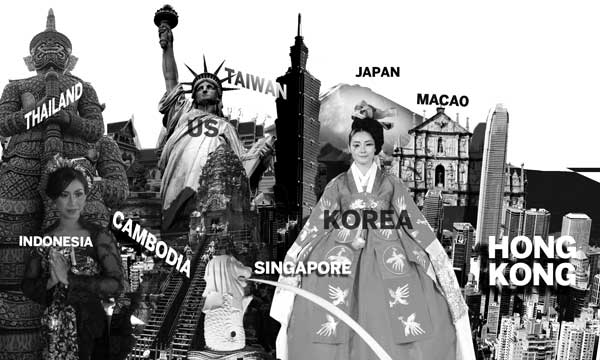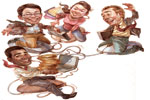Manners still missing in overseas travel
Updated: 2013-08-20 01:11
By LI XIAOKUN in Beijing, LI XIANG in Paris, CHEN JIA in Los Angeles, and ZHANG CHUNYAN in London (China Daily)
|
|||||||||||
Sharp increase in numbers leads to high visibility for Chinese tourists
Recent misbehavior by Chinese tourists overseas has made headlines around the world, with Chinese authorities writing travel etiquette into regulations to help travelers prepare for and respect other cultures.
Asked about the behavior of Chinese tour groups abroad, Kay Popken, managing director of strategy and development in China at German airline Lufthansa, was blunt.
 |
|
Source: China Tourism Academy |
"They tick off the sightseeing spots, take their photos and then drive off to the next location. Many seem mostly interested in the shopping, often for luxury items.
"Who among them is really interested in those Gothic cathedrals and has been reading about them in preparation for the trip?"
In recent months, the misbehavior of Chinese tourists abroad has been covered by traditional and social media at home and overseas, causing much embarrassment and soul-searching in China.
Alert to the complaints, the central government has reacted quickly and sought countermeasures.
In some of the more notorious incidents, two Chinese passengers fought so hard on a flight from Zurich to Beijing that the plane was forced to return.
In another case that made headlines, a middle school student carved his name on a 3,500-year-old Egyptian temple.
And two groups of visitors brawled and fought in lavender fields in France over where to stand to take photographs.
Other behavior that has been criticized ranges from wasting food at buffets to refusing to wait in line and not leaving tips.
A Foreign Ministry official, who declined to be named, said that about half of all cases handled by overseas Chinese diplomats nowadays are triggered by the inappropriate behavior of Chinese citizens.
Wang Haidong, operational manager of London-based Yang Guang (Sunshine) Holiday Travel Agency, said Chinese tourists are inclined to talk loudly in restaurants, in a way that disturbs diners at nearby tables.
They should learn to talk to each other and restaurant employees in a respectful and courteous manner, Wang said.
An assistant manager at Chanel in the Galeries Lafayette department store in Paris, who declined to give her name because she is not authorized by the company to comment, said: "Chinese customers are always in a hurry and they want everything to be done very quickly.
"And sometimes they are suspicious that we have raised the price and we have to assure them that we have not."
In recent years, Chinese tourists have often been listed as being among the worst in the world. Thailand's The Universal Daily News said on Aug 6 that loud Chinese visitors have been hampering the Thai tourism industry.
However, some senior Western tourism professionals say there is an obvious reason for the surge in complaints about Chinese tourists and troubles with tour groups — there has been an unprecedented surge in the number of Chinese traveling overseas.
Other voices
Chinese citizens are expected to make 94.3 million overseas tours in 2013, a 15 percent year-on-year increase, making China the top country of origin for outbound tourists.
The UN World Tourism Organization said Chinese tourists spent $102 billion abroad in 2012, surpassing German and US travelers as the world's top international spenders.
Tom Jenkins, executive director of the European Tour Operators Association, said, "When many (Chinese) people come, the behavior of one or two individuals creates headlines, although 99.9 percent behave beautifully."
Dai Bin, head of the China Tourism Academy, said during an online chat with Internet users on Aug 13 that over the past decades China had grown from being "a child" in the global tourism industry into the world's largest source of outbound tourists.
"A child suddenly grows up and naturally attracts others' attention," he said, adding that some people have overreacted to Chinese tourists' misbehavior.
"We should separate cultural differences from illegal conduct. For instance, fighting on a plane is not allowed anywhere."
Chen Chaoying, founder and manager of the Mandarin Voyages Travel Agency in Paris, who has 20 years' experience in the tourism industry, said: "Much of the behavior that is considered uncivilized has to do with cultural differences. For example, speaking loudly is often considered rude in France, but for Chinese people it is normal.
"Many Spanish and Italian tourists also speak loudly. It has to do with their personalities and different ways of living.
"Twenty years ago, most tourists from China were sent by the government. They wore similar suits and shiny leather shoes. Now, Chinese tourists come from all kinds of backgrounds and they are dressed more casually and have better interaction with the local people and cultures.
"There is also a lot of criticism that Chinese tourists spend lavishly on luxury goods abroad. I think it is a matter of personal choice and freedom."
Travel habits and consumer behavior will gradually change as outbound tourism develops, Chen added.
"Traveling is a process of personal enrichment and education," he said. "Chinese don't need to be so self-critical. In fact, the image of Chinese tourists nowadays is not as bad as people think at home.
"They do love taking photos, but you will hardly find any Chinese tourists on the Champs Elysees in Paris who spit or talk loudly. And most of them receive a very warm and friendly welcome in the countries they visit."
Yet, in August, more than 2,500 comments were made about the misbehavior of Chinese tourists overseas on Sina.com.cn, a major Chinese news portal.
Most people said the Chinese should reflect more about themselves, the bottom line being that a tourist should respect, not disturb, others.
Changing habits
On Aug 6, People's Daily cited cases involving China's neighbors to explain that improving the behavior of outbound tourists requires constant work.
It said that in the 1960s, Japanese visitors left a negative impression around the world. To solve the problem, the Japanese government printed an etiquette brochure, using cartoons to teach citizens behavior such as not walking in the street in slippers.
Sina.com.cn also said in a column that in the 1990s many people from South Korea were embarrassed by the behavior of some of their compatriots abroad.
The South Korean authorities later suggested all outbound travelers from the country take lessons on the cultures of the countries they were to visit before leaving.
In recent weeks, high-ranking Chinese officials have called on citizens to behave in a more civilized manner on overseas trips.
On July 31, the China National Tourism Administration issued six notices about "civilized tourism" in one day. The documents included a guide for outbound tourists, which is soon expected to be included in travel contracts. Tourists failing to behave well may be fined.
Some Chinese media said the recent official moves are a third government attempt to improve Chinese people's habits, following previous efforts in 1952 and 1981.
Will the situation improve? Kay Popken from Lufthansa thinks it will take time.
"The solution lies in better preparation for everyone and in getting tourists genuinely interested in a country, its people and its culture."
Wang Mingjie in London contributed to this story.
Related Stories
Chinese tourists left $130 million in Europe 2013-08-09 16:32
China-US tourism gets a boost 2013-08-12 10:56
Today's Top News
Space trip to be offered in China for $220,000
Probe shows policeman drunk before injuring baby
Fearless Gran's video for gay grandson goes viral
Trading mishap reveals flaws in securities sector
CIA document release acknowledges Area 51
Be innovative, Premier Li tells graduates
Beijing, Moscow cooperate on floods
2nd New Zealand dairy scare
Hot Topics
Lunar probe , China growth forecasts, Emission rules get tougher, China seen through 'colored lens', International board,
Editor's Picks

|

|

|

|

|

|





